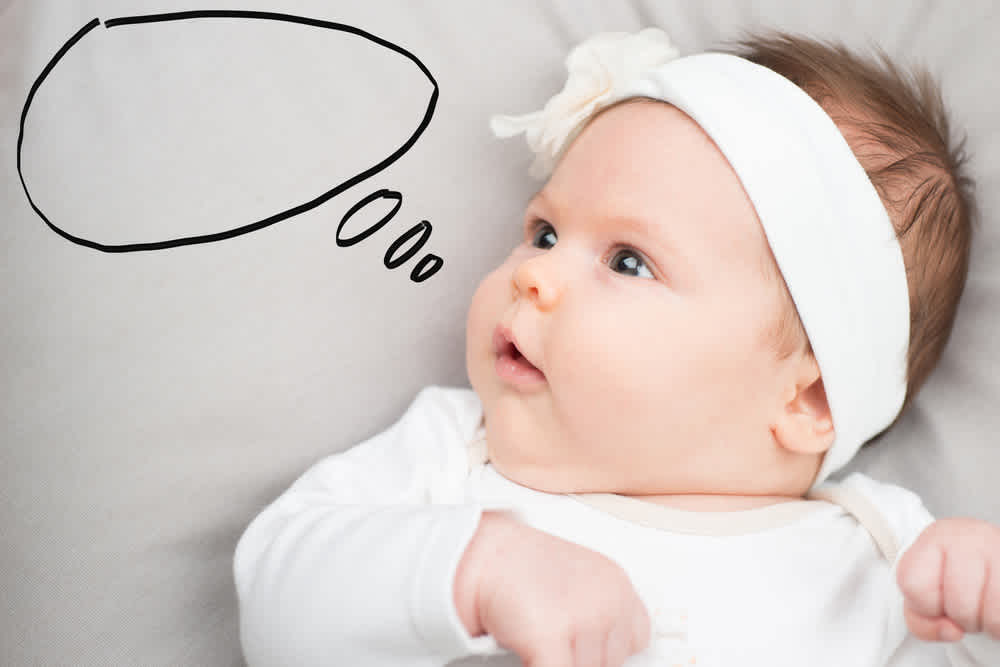Speech and language development - the first 1000 days
Written by Joanne Lillie | Journalist
Tags: Speech & LanguageStimulationGrowth and DevelopmentPlay
Speech and language are the skills we use to communicate with others. We form these skills during the first years of life. The most intensive period of speech and language development for humans is during the first three years of life, a period when the brain is developing and maturing rapidly.
The development of communication skills begins in infancy, before the emergence of the first word. The communication skills that babies learn in their first year set the stage for success in developing reading, writing, and social skills later in life. Any speech or language problem is likely to have a significant effect on a child’s social and academic skills and behavior.
Children must develop adequate language skills to relate with their parents and peers, as well as to grow into a person who can socially interact with others through life. Good speech and language skills furthermore form an essential foundation to help children be more successful with reading, writing, schoolwork, and interpersonal relationships. In order to grow intellectually, a child’s vocabulary needs to grow, because words and intellect are linked.
Carianne Vermeulen,speech and language therapist for Nubabi shares some important milestones you should notice in your little one in the first three years:
Birth to age one:
- The first signs of communication occur when an infant learns that a cry will bring food, comfort and companionship.
- Newborns also begin to recognize important sounds in their environment, such as the voice of their mother or primary caregiver.
- As they grow, babies begin to sort out the speech sounds (phonemes) or building blocks that compose the words of their language.
- Babies start to process the communication signals they receive and learn to vary their cries to communicate their needs.
- As the speech mechanism (jaw, lips and tongue) and voice mature, an infant is able to make controlled sound. This begins at approximately two months of age; ‘cooing’, a quiet, pleasant, repetitive vocalization.
- By six months of age, most babies recognize the basic sounds of their mother tongue.
- By this time, an infant usually babbles or produces repetitive syllables such as ‘ba, ba, ba’ or ‘da, da, da’.
- Babbling soon turns into a type of nonsense speech (jargon) that often has the tone and rhythm of human speech but does not contain real words.
- By the end of their first year, most children have mastered the ability to say a few simple words. Children are most likely unaware of the meaning of their first words, but soon learn the power of those words as others respond to them.
Eighteen months to two years:
- After the first birthday through age two, a toddler’s speech and language development is rapid. During this time, one-year-olds learn that words have meaning. They point to things they want, and often use one- or two- syllable sounds, such as ‘baba’ to refer to other children or ‘woo-woo’ to refer to a dog.
- By their first birthday children can name their parents by using ‘mama’ and ‘dada’.
- By eighteen months of age, most children can say approximately 50 words and recognize the names of an increasing amount of objects, including those in pictures.
- They also understand simple requests, especially when accompanied by gestural cues, and statements such as ‘all gone’.
- By age two, most are putting words together in short phrases like ‘want cookie’ or ‘more milk’. The majority of two-year-olds talk a lot. They should be able to name some body parts (such as their eyes, nose, arms, legs) and everyday objects (like ‘ball’, ‘car’, ‘bottle’, ‘dog/cat’, etc.). Not all their words have to be intelligible; some are made-up and combined with real words.
- In addition to understanding simple requests, they can also follow them (such as ‘Go get your shoes in your room.’). At this stage, they should be using at least 150-200 different words. Pronouns (like ‘me’) are emerging, but often incorrectly used. During this period, children rapidly learn that words symbolize or represent objects, actions and thoughts. At this stage they also engage in representational or pretend play.
Ages two to three:
- By age three years, most children can follow two-to-three step instructions (like ‘wash your face and comb your hair’) and they like to listen to books/stories for longer periods of time. Now their vocabulary rapidly increases and they begin to master the rules of the language. They use approximately 300 different words at this stage and are able to answer simple questions (like ‘Where is …’, ‘Can you …’).
- They start requesting items by name (e.g. ‘Give my ducky.’) and begin to use simple plural forms (e.g. ‘books’).
- More pronouns are being used by now (e.g. mine, yours, he, she, etc.) and regular verb endings begin to emerge (e.g. ‘running’).
- Three-year old toddlers can use short but complete sentences containing three to five words (e.g. ‘I want more juice.’; ‘Daddy going to work.’). ‘What’ (e.g. ‘What is that?’), where” (e.g. ‘Where is daddy?’) and ‘why’ become popular questions at this age. By age three, a child’s speech should also be intelligible to unfamiliar people at least 75% of the time.
- They use language not only to get things by asking, they are talking about past experiences and even beginning to use it to pretend and during pretend play.

Here are some activities to help boost your baby’s speech and language development:
Note: The activities below are examples and may not be suited to your child right now. To find activities that are just right for your child’s developmental stage, try Nubabi’s Weekly Stimulation Guide. You can sign up for a 2 week Free Trial here.
Watch me!
Eye contact creates a strong emotional connection that makes your baby feel loved and special. It is also a key precursor to communication. You can help your baby develop good eye contact by encouraging him to look at you. Suitable for 0-12 months. Carianne Vermeulen, speech and language therapist for Nubabi
What to do:
- Hold your baby in your lap with his head at your knees. Lean forward so that your face is about 20 - 30 centimeters away from your baby’s face.
- Talk to your baby in an interesting voice, using different pitches (i.e. not monotone).
- Stimulate your baby’s language by telling him “Look at me.” If your baby loses interest in looking at you (making eye contact), prompt by changing the pitch of your voice to regain his attention.
Talking toddler
At 12 – 18 months, it is clear that your child understands most of what you say to him even though you can’t understand everything he is saying yet. Understanding of language is a crucial step toward the use of language. You have been feeding your precious toddler’s understanding of language since the first time he heard your voice before he was born. In your baby’s second year of life he is like a sponge, soaking up information in his environment. Carianne Vermeulen, speech and language therapist for Nubabi
What to do:
- Help your baby in perfecting his understanding of language, storing up vocabulary, and absorbing the many slippery rules of language. Speak to your toddler at any and every opportunity using a variety of words and responding positively to and expanding on his efforts to speak.
- Describe what you or your baby are doing in full sentences, by using action words (e.g. eat, catch), pronouns (e.g. you, he, she), prepositions (e.g. on, under) and descriptive words (e.g. round, small, fast).
Name that part
Around 18 – 24 months, your baby is growing and changing so quickly! He’s learned the names of lots of objects. You can teach him more about himself as you play a simple body part game. He will learn by looking, listening, touching and talking. He will also practice telling you whether he wants to continue an activity or not. Carianne Vermeulen, speech and language therapist for Nubabi
What to do:
- Sit across from your baby and play a touch-and-name game. Touch your nose and say “Nose. Mommy’s nose.” Then ask your baby to touch your nose. Encourage him to say “nose” as he points. Next, ask “Where is Jason’s nose?” Wait. Touch it and say “Jason’s nose.” Ask him to touch his nose. If he does, praise him.
- Repeat the game with his eyes, ears, hair, feet, and hands. Encourage him to name his body parts as he touches them. Make some movements like clapping your hands, wiggling your toes, patting your head, touching your eyelids, and covering your ears. Be sure to tell your child what you are doing. Encourage him to copy your movements and ‘talk’ to you about what he is doing.
- Now stop the actions. If your baby protests, say “Oh, do you want to clap again? Should we clap some more?” Encourage him to say “more” and continue the game.
- For more fun, have your child play this touch-and-name game with his stuffed animals or a doll.
Patience is a virtue
Between the age of two and three years, your toddler’s language is probably developing at a very quick pace and you will notice him using new words daily! This is a very exciting age as your toddler is beginning to communicate through a conversation with you and you start to get an idea of what is going on in his head. Also characteristic of this stage is jumbled up words and sentences that don’t always make sense. Help your toddler be more successful in getting his message across by being patient with him. Carianne Vermeulen, speech and language therapist for Nubabi
What to do:
- Although we don’t always have the time, one thing that will really help your toddler with effective communication is if you’re patient with him. He can now join in a conversation with you, but he’ll still find it difficult to put words in the right order to form a sentence. It is perfectly normal for your toddler to produce jumbled sentences at this stage. Don’t comment on his jumbled sentence, but rather repeat his sentence and emphasize the words in the right order (e.g. Toddler: “The cat the food eat.” Parent: “Yes, the cat eats the food.”)
- When you ask him a question, give your toddler at least 10 seconds to think about his answer and to put his thoughts into words. Follow your toddler’s lead to talk about what interests him. This will keep him engaged and eager to chat.
- Talk to him and ask questions about what he is doing. Also answer his questions in short sentences to provide a good model for him to copy. Help your toddler become a confident talker by showing a real interest in what he is saying.
For more activities that will boost your baby’s Speech and Language Development and other key developmental skill areas, visit Nubabi and sign up for your 2 week Free Trial.
Share this
- 0
- 0
Related Posts
Have you tried the Nubabi Free Trial?
Get unlimited access to Your Parenting Toolkit for 2 weeks for free!
Track, Boost, Explore and Capture your child's growth and development.
Available on both mobile and web.






